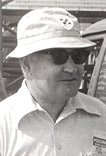 Like many people, Emmett Moore, who was born in 1911, began his motorcycle career with a photograph and a lust for two wheels.
Like many people, Emmett Moore, who was born in 1911, began his motorcycle career with a photograph and a lust for two wheels.
As a young man who was still riding a bicycle, Moore came across an advertisement in American Motorcyclist & Bicyclist magazine for a single-cylinder 1928 Indian Prince and knew that he must have one. In the spring of 1930 he visited the local Cincinnati Indian, Excelsior and Harley-Davidson motorcycle dealers. It was in the Harley-Davidson shop that he found his prize, a 1928 Indian Prince, for $85, and purchased it on an installment plan. One of the shop’s mechanics spent time teaching the young Moore to ride before letting him venture off on his own. Later that year, he traded in the Prince for a 1929 Indian 101 Scout.
Motorcycles continued to influence Moore’s life, and fate stepped in one day in 1952 in a way that proved pivotal. In his spare time Moore wrote several articles for The Motorcycle magazine, and was commissioned to cover the 200-mile National Championship motorcycle races in Dodge City, Kan. There he met Al West, the Indian sales manager who knew of Moore’s writings. During their conversations, Moore talked of his long experience riding Indians, and expressed his dream of working at the Indian factory. Two weeks later, a letter arrived inviting Moore to travel to Springfield, Mass., for an interview. He was hired into the advertising department that fall, and continued with the faltering company into 1954.
In 1954, Moore shared his interest in old motorcycles by founding The Antique Motorcycle Club of America, Inc. (AMCA), along with Ted Hodgdon, Henry Wing Sr., and Henry Wing Jr. The four men each donated $5 to print a newsletter and attract other collectors interested in the fledgling organization that now is a global club devoted to the preservation and restoration of antique motorcycles.
Later that same year, Moore was offered a position as advertising manager for the American branch of BSA in Nutley, N.J., responsible for distributing BSA, Ariel and Triumph motorcycles in the U.S.
Working at BSA didn’t prove entirely satisfactory to Moore, and one day he noticed an advertisement for a new Japanese company, Kawasaki, which was located in nearby Avenel. He was impressed with the modern facility and its efficient operation, and accepted an offer to serve as the Dealer Service Manager on Sept. 11, 1967. Moore finished his working career at Kawasaki.
Moore had one more step in his motorcycling life. In 1982, along with George Yarocki of Torrington, Conn., he organized a new organization devoted to his favorite motorcycle, the Indian 101 Scout. The 101 Association still exists today.
Moore died in 1992 and was inducted into the AMA Motorcycle Hall of Fame in 1998.